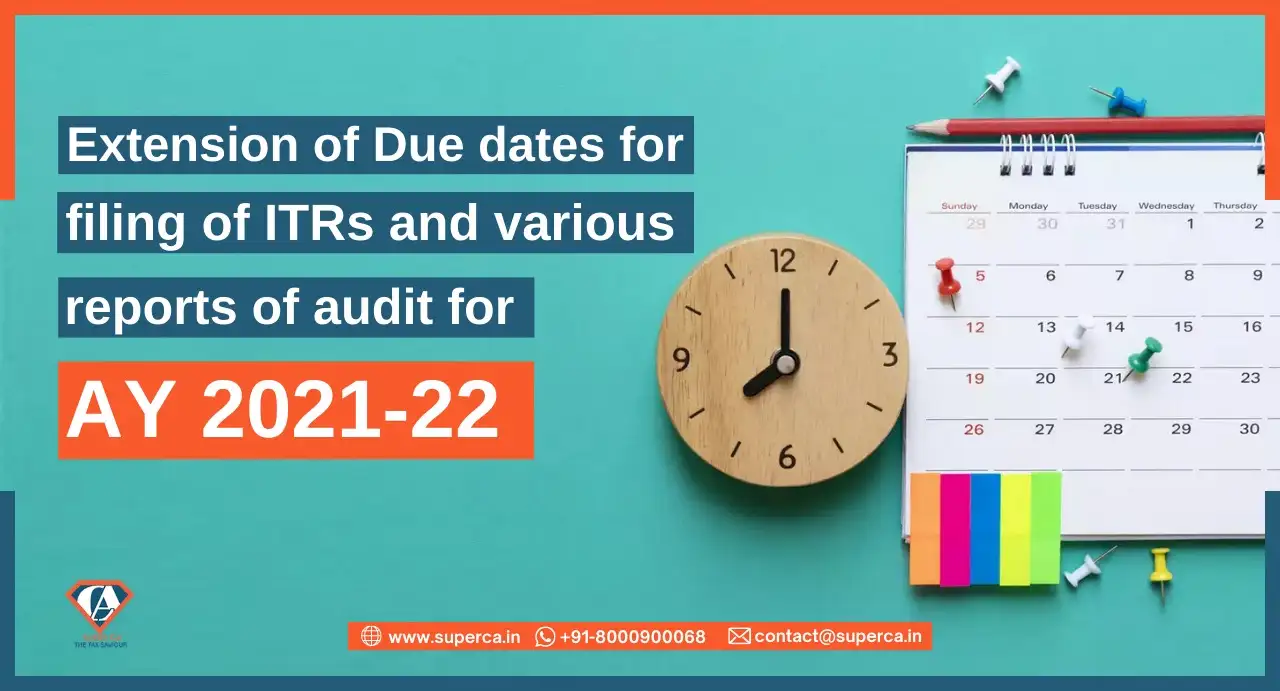Due Dates of ITR forms for Individuals & Businesses for AY 2023-24
- Posted By SuperCA
- On 11 January

About
Income Tax Return (ITR) is a form used by taxpayers to file their tax returns with the Income Tax Department of India. All Indian taxpayers who had income in the prior fiscal year were required to file an ITR. It is mandatory for ones whose income was above the threshold limit. Depending on the taxpayer's income, source of income, and type of taxpayer, the government has set varied ITR form due dates. In this blog, we’ll discuss several ITR forms in India for the AY 2023–2024 and their submission deadline.
ITR Forms and their Due Dates
|
ITR |
Description and Due Date |
|
ITR-1 |
ITR-1 or Sahaj is for salaried individuals who have income from salary, pension, or interest. The due date for filing ITR-1 for AY 2023-2024 is July 31, 2023. |
|
ITR-2 |
ITR-2 is for people and HUFs (Hindu Undivided Families) who make money from sources besides their place of employment or business.The due date for filing ITR-2 for AY 2023-2024 is July 31, 2023. |
|
ITR-3 |
For individuals and HUFs with income from a business or profession, use ITR-3. The due date for filing ITR-3 for AY 2023-2024 is September 30, 2023. |
|
ITR-4 |
For people, HUFs, and partnership firms who have chosen the presumptive taxation scheme, there is the ITR-4 or Sugam.The due date for filing ITR-4 for AY 2023-2024 is November 30, 2023. |
|
ITR-5 |
Limited Liability Partnerships (LLPs), Associations of People (AOPs), Bodies of Individuals (BOIs), and partnership firms must file Form ITR-5. The due date for filing ITR-5 for AY 2023-2024 is September 30, 2023.
|
|
ITR-6 |
Companies that do not claim an exemption under Section 11 of the Income Tax Act of 1961 should file an ITR-6. ITR-6 submissions for AY 2023–2024 must be received by October 31, 2023. |
|
ITR-7 |
ITR-7 is for individuals, including businesses, who are required to submit a return in accordance with Income Tax Act of 1961 sections 139(4A), 139(4B), 139(4C), or 139(4D) The due date for filing ITR-7 for AY 2023-2024 is September 30, 2023. |
It is essential to note that the deadlines for submitting ITRs may occasionally vary, and taxpayers must stay current with the most recent information. The government has the right to extend the deadlines for filing ITRs in the event of a natural disaster, pandemic, or other unexpected circumstance. In certain situations, taxpayers are free to file their ITRs by the extended deadline without facing any penalties or interest.
The Income Tax Act requires certain categories of taxpayers to get their accounts audited before filing their ITRs. The audited assessees are required to file their ITRs by a later date than non-audited assessees.
The due date for filing ITRs by audited assessees varies depending on the type of assessees. Here are the due dates for filing ITRs by audited assessees for AY 2023-2024:
- For companies: November 30, 2023.
- For persons other than companies whose accounts are required to be audited: October 31, 2023.
It is important to note that in addition to filing their ITRs, audited assessees must also submit their tax audit report. After looking over the taxpayer's books of accounts and other pertinent documents, a chartered accountant will create a tax audit report. The tax audit report details whether the taxpayer complied with numerous aspects of the Income Tax Act, including the upkeep of accurate books of accounts, source-deduction of taxes, and advance tax payment. Assessees who have had their ITRs audited risk penalties and interest if they submit them after the deadline. An audited assessee may be penalized up to Rs 10,000 if it doesn't submit its ITR by the deadline. Additionally, if an audited assessee submits their ITR after the deadline, they may be required to pay interest on the amount of tax due at a rate of 1% per month or portion thereof.
Significance of Filing Returns Timely
It's crucial for individuals and businesses to submit their ITR within the specified deadline. A penalty of up to Rs 10,000 is imposed if your ITR is not submitted by the deadline. Additionally, if you submit your ITR after the deadline, you will be required to pay interest on the amount of the tax payable at a rate of 1% every month or portion of a month.
Also, it's critical to submit your ITR on time to prevent needless harassment from the Income Tax Department. If you submit your ITR after the deadline, the Income Tax Department may send you a notification requiring you to provide an explanation. Thus, it is advised that you submit your ITR by the deadline in order to prevent any difficulties or legal issues.
The advantages of reporting your ITR on time go far beyond avoiding fines and interest. One of the major advantages is that it makes it easier to obtain loans and visas. You must present your ITR as evidence of your income if you want to apply for a loan or a visa. You can have trouble getting a loan or a visa if you don't have a copy of your ITR.
Maintaining a good financial record also benefits from submitting your ITR on time. It demonstrates that you are a law-abiding, responsible taxpayer who is aware of his or her tax obligations. Building a good reputation in the financial sector can help you in a number of ways, such as obtaining better loan conditions or luring investors to your company.
Conclusion
Filing your ITR on time is crucial for all taxpayers in India. All taxpayers must take their tax liabilities seriously and file their ITRs within the due date.The government has set different due dates for various ITR forms, and taxpayers must stay updated with the latest information to avoid any penalties or interest.
In today’s atmosphere where there is a rapid change of tax policies, SuperCA acts as a Tax Saviour for you. Our systems are designed to ensure that the clients get the maximum possible tax exemptions and at the same time stay compliant with the policies. We also make sure that they don’t pay more tax than they owe. We can keep you away from the nightmares of technical details of tax codes which can be overwhelming for a lot of individuals and small businessmen.
Further, people must also take into account the new rules and modifications the government has proposed for the AY 2023–2024, such as the pre-filled income tax forms and the new tax structure. Making informed decisions and maximizing their tax preparation for the forthcoming fiscal year can be achieved by seeking the advice of tax professionals or financial counselors. At SuperCA, you’ll get one-stop solutions to all of your tax-related concerns from our in-house tax and finance specialists. Do contact us for a no-cost consultation.





